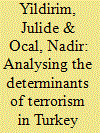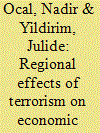| Srl | Item |
| 1 |
ID:
120392


|
|
|
|
|
| Publication |
2013.
|
| Summary/Abstract |
This paper investigates the determinants of provincial terrorism in Turkey taking spatial dimension into account for the time period 1990-2006. Following a traditional global regression analysis, spatial variations in the relationships are examined with geographically weighted regression (GWR) to obtain locally different parameter estimates. Empirical results indicate that increases in income and schooling ratio tend to reduce the provincial average level of terrorism, whereas an increase in unemployment enhances it. Moreover, GWR results indicate that the provincial effects of per capita income and education are more pronounced for the Eastern and South Eastern provinces compared to the Western provinces.
|
|
|
|
|
|
|
|
|
|
|
|
|
|
|
|
| 2 |
ID:
176108


|
|
|
|
|
| Summary/Abstract |
A growing literature highlights the presence of spatial differences in solar photovoltaic (PV) adoption patterns. Central to forward planning is an understanding of what affects PV growth, yet insights into the determinants of PV adoption in the literature are limited. What factors do drive the adoption at local level? Are the effects of these factors geographically uniform or are there nuances? What is the nature of these nuances? Existing studies so far use aggregate macro datasets with limited ability to capture the role of peer effects. This paper considers some established variables but also broadens the base of variables to try to identify new indicators relating to PV adoption. Specifically, it analyses domestic PV adoption in the UK at local level using data on the number of charities as a proxy to capture the opportunities to initiate social interactions and peer effects. A geographically weighted regression model that considers the spatially varying relationship between PV adoption and socio-economic explanatory variables reveals significantly more variability than the global regression. Our results show that charities and self-employment positively influence PV uptake while other socio-economic variables such as population density has bidirectional impacts.
|
|
|
|
|
|
|
|
|
|
|
|
|
|
|
|
| 3 |
ID:
098416


|
|
|
|
|
| Publication |
2010.
|
| Summary/Abstract |
The economic growth effects of terrorism have generally been examined in a cross-country framework where socio-economic differences among the countries are ignored. This highly restrictive assumption may result in heterogeneity bias, which could be overcome by resorting to country studies rather than cross-country analysis. Moreover, the relationship between the terrorist incidents and various factors may not be stationary in space. The majority of terrorist incidents in Turkey are concentrated mainly in Eastern, and South Eastern Turkey and big cities. Thus, the geographical dispersion of terrorist incidents in Turkey may result in uneven regional impact, necessitating local parameter estimates. This study analyses the effects of terrorism on economic growth across provinces of Turkey for the time period 1987-2001. Following a traditional global regression analysis, spatial variations in the relationships are examined with geographically weighted regression (GWR) to obtain locally different parameter estimates. A GWR approach allows the modeling of relationships that vary over space by introducing distance-based weights to provide parameter estimates for each variable and each geographical location. Empirical evidence indicates that a GWR model significantly improves the model fitting over the traditional global model. Even though the traditional convergence analysis reveals that terrorism hinders economic growth, GWR results indicate that its provincial effects are more pronounced for the Eastern and South Eastern provinces compared to the Western provinces. Moreover, empirical findings suggest that there is a considerable variation in speeds of convergence of provinces, which cannot be captured by the traditional beta convergence analysis.
|
|
|
|
|
|
|
|
|
|
|
|
|
|
|
|